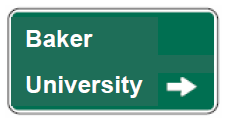Destination Guide Sign Design Guidelines: Difference between revisions
Bruce Wacker (talk | contribs) |
m Text replacement - "[[File:" to "[[Image:" |
||
| Line 5: | Line 5: | ||
== MUTCD Requirements: == | == MUTCD Requirements: == | ||
“Destination Guide” signs are essential to direct road users along streets and highways, to inform them of intersecting routes, to direct them to cities, towns, villages, or other important destinations, to identify nearby rivers and streams, parks, forests, and historical sites, and generally to give such information as will help them along their way in the most simple, direct manner possible. [[ | “Destination Guide” signs are essential to direct road users along streets and highways, to inform them of intersecting routes, to direct them to cities, towns, villages, or other important destinations, to identify nearby rivers and streams, parks, forests, and historical sites, and generally to give such information as will help them along their way in the most simple, direct manner possible. [[Image:Destination Guide Sign.png|right]] | ||
“Destination Guide” (D1-1 through D1-3) signs shall display the name of a city, town, village, or other traffic generator, and a directional arrow. If several destinations are to be displayed at a single point, then several names may be placed on a single sign with an arrow (and the distance, if desired) for each name. If more than one destination lies in the same direction, a single arrow may be used for such a group of destinations. | “Destination Guide” (D1-1 through D1-3) signs shall display the name of a city, town, village, or other traffic generator, and a directional arrow. If several destinations are to be displayed at a single point, then several names may be placed on a single sign with an arrow (and the distance, if desired) for each name. If more than one destination lies in the same direction, a single arrow may be used for such a group of destinations. | ||
Revision as of 09:24, 15 August 2014
City Guidelines Regarding the Installation of “Destination Guide” (D Series) Signs
Traffic Services Division of the Department of Public Works
Governing Document Reference:
Manual on Uniform Traffic Control Devices for Streets and Highways (MUTCD), 2009 or latest edition and the Overland Park Municipal Code (OPMC), Title 12 – Traffic, Chapter 12.04.
MUTCD Requirements:
“Destination Guide” signs are essential to direct road users along streets and highways, to inform them of intersecting routes, to direct them to cities, towns, villages, or other important destinations, to identify nearby rivers and streams, parks, forests, and historical sites, and generally to give such information as will help them along their way in the most simple, direct manner possible.

“Destination Guide” (D1-1 through D1-3) signs shall display the name of a city, town, village, or other traffic generator, and a directional arrow. If several destinations are to be displayed at a single point, then several names may be placed on a single sign with an arrow (and the distance, if desired) for each name. If more than one destination lies in the same direction, a single arrow may be used for such a group of destinations.
An arrow pointing to the right shall be at the extreme right of the sign, and an arrow pointing left or up shall be at the extreme left. An arrow pointing up may be placed at the extreme right of the sign when the sign is mounted to the left of the traffic to which it applies.
City of Overland Park Guidelines for Installation:
Correspondence with the Kansas Department of Transportation (KDOT) is required to determine if a “Destination Guide” sign is to be installed on city streets. The City guidelines require that the sign be used to orient and guide the motorist from a specific point of beginning to a specific point of ending.
To qualify for installation, there has to be an initial point from which a motorist would likely have to encounter the first sign to be able to proceed to the desired destination. This initial point shall be a recognized guide sign approved by KDOT which is placed on the interstate or a major highway. Once KDOT approves the sign installation on the interstate or major highway, the City will install additional guide signs.
The point of beginning is the intersection of the city street and the interstate ramp or highway. The point of ending is the destination or the actual location of the facility for which the directions are intended.
A minimum number of signs shall be installed to provide guidance to the traveling public via the shortest or most direct route. Signs will be placed in advance of the intersection where the motorist is required to change direction. Intermediate mid-block signs will not be installed. Signs will not be installed to direct the motorist to any private drives off of a city street.
Signing Standards:
The “Destination Guide “sign shall have a white message and border on a green background. All messages, borders, and legends shall be retro-reflective and all backgrounds shall be retro-reflective.
For most “Destination Guide” signs, the legends are so variable that a standardized size is not appropriate. The sign size is determined primarily by the length of the message and the size of lettering and spacing necessary for proper legibility. The shape of “Guide” shall be rectangular.